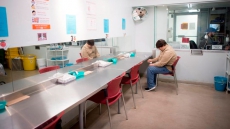BEIJING — Chinese official media on Monday accused two Canadians detained in China of acting together to steal state secrets, just days after Canada announced it will proceed with a U.S. extradition request for a senior Chinese tech executive.
The Xinhua News Agency cited unidentified Chinese authorities as saying former Canadian diplomat Michael Kovrig violated Chinese laws by acting as a spy and stealing Chinese state secrets and intelligence with the help of Canadian businessman Michael Spavor.
Both Canadians were arrested on Dec. 10 in what was widely seen as an attempt to pressure Canada to release Chinese executive Meng Wanzhou, who was arrested in Vancouver on Dec. 1 at the request of U.S. authorities.
Canada said last Friday that it will allow a U.S. extradition request for Meng to proceed. Meng is chief financial officer of Chinese tech giant Huawei and the daughter of its founder. The U.S. is seeking Meng's extradition to face charges she misled banks about the company's business with Iran.
Xinhua accused Kovrig of often entering China using an ordinary passport and business visas, and acquiring information from his "main contact," Spavor.
"Authorities stressed that China is a country ruled by law and will firmly crack down on criminal acts that severely undermine national security," Xinhua said.
The same information was posted on the official news blog of the ruling Communist Party's Central Political and Legal Affairs Commission.
Kovrig is a former diplomat who was working as an expert on Asia for the International Crisis Group think-tank . Spavor is an entrepreneur known for contacts with high-ranking North Korean officials, including leader Kim Jong Un, with whom he has been photographed shaking hands and laughing.
TRUDEAU DISMISSES CHINA REPORT ANONYMOUSLY ACCUSING KOVRIG, SPAVOR OF ESPIONAGE

OTTAWA — Prime Minister Justin Trudeau is dismissing reports in China that two imprisoned Canadians tried to steal state secrets from the People's Republic.
Trudeau says it is unfortunate China continues to push forward with detentions of former Canadian diplomat Michael Kovrig and entrepreneur Michael Spavor.
They were arrested in December by Chinese authorities and accused of violating the country's national security more than a week after Canada arrested Meng Wanzhou, the chief financial officer of Chinese tech giant Huawei Technologies, at the request of the U.S., which wants to extradite her for fraud.
"We are a country of the rule of law. We will ensure that that rule of law is fully respected and we will go through those processes in a proper and rigorous way," Trudeau told reporters in Prince Edward Island.
"It is unfortunate that China continues to move forward on these arbitrary detentions."
An anonymously sourced report in China's state-controlled Xinhua News Agency reported Monday that Kovrig and Spavor worked together to steal state secrets, linking their cases for the first time.
Kovrig and Spavor have been imprisoned without being formally charged or granted access to lawyers, and their Canadian consular visits have been limited to approximately one a month — while Meng has been released on bail and is living in a Vancouver mansion.
Meng's lawyers said Sunday she would file a civil lawsuit against the Canadian government over her Dec. 1 arrest.
Chinese Foreign Ministry spokesman Lu Kang was asked Monday at a briefing in Beijing whether that amounted to a double standard, but he brushed aside the suggestion.
"China has strictly fulfilled our due obligations as required in the China-Canada Consular Agreement," Lu said, according to a translated version of his remarks posted to his department's website.
He said China "took compulsory measures" against Kovrig and Spavor, because they were suspected of undermining China's national security.
"I believe you are well aware that it is common practice for all countries in the world to deal with cases concerning national security in this way," said Lu.
"China has made necessary consular notifications to the Canadian side and fulfilled our due obligations as required in the China-Canada Consular Agreement."
As for Meng's treatment by Canada, Lu said it amounted to "a grave violation of her legitimate rights and interests and also constitutes a serious political incident."



